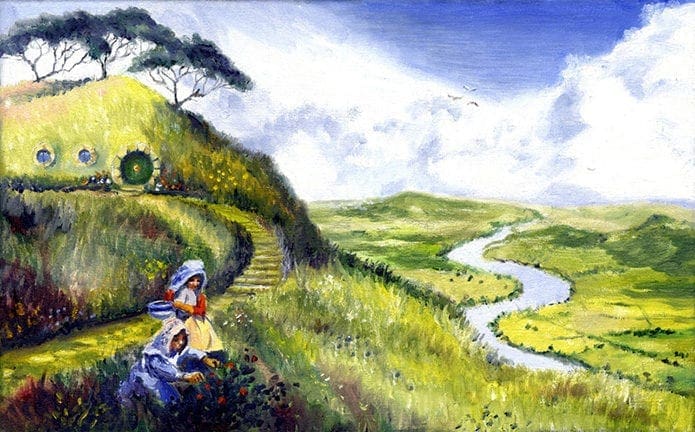
Blackberry winter in heaven
By LORRAINE V. MURRAY, Commentary | Published April 20, 2017
She was a Southern lady who wore her waist-length hair carefully braided and coiled upon her head. She never donned slacks, nor did she appear in public without pantyhose—which she called nylon stockings.
Born in Rome, Georgia, in 1903, Gladys was my husband’s maternal grandmother, although no one ever called her “Mom” or “Grandma,” just Gladys.
When I met her, she was a widow, living alone in a simple house with a small yard, wherein reigned her dog, Callie—who wouldn’t hesitate to attack unwanted invaders.
The family held their breath when I first encountered the dog, wondering whether she would take to me or not. You see, although I didn’t know it, the dog had a reputation for nipping the occasional houseguest.
Fortunately, the scruffy beast didn’t even bark at me, but instead ambled over and gently sniffed my hand—and officially welcomed me to the family.
I think of Gladys every spring when there’s a steep dip in the temperatures—a phenomenon known as blackberry winter.
Without this chill, the fruit wouldn’t set upon the vine—and provide an abundance of purple jewels in summer.
Whenever she came to visit her daughter and grandchildren for a special occasion, Gladys carried a basket, in which rested one of her famous pies covered with a tea towel.
Blackberry was her specialty, made with berries harvested in the woods near her daughter’s house by her grandchildren—Jef, Lisa and Steve, and eventually, yours truly.
The house was my husband’s childhood home, tucked back on remote acreage outside of Rome and surrounded by mountains.
In the woods, there grew an abundance of tangled, thorny vines laden with the largest blackberries I’d ever seen.
But make no mistake—this wasn’t Eden before the fall, when the world was bereft of suffering. Instead, we picked the heavily thorned berries at a steep price—which included sunburned faces, punctured fingers and mosquito bites.
For me, there was also a constant fear of snakes that might be lurking nearby—since they too had a penchant for the fruit.
Still, mosquito bites and sunburn were soon forgotten, when word got out that Gladys was baking a pie.
While this miracle unfolded, Callie napped, flat on her belly to absorb some chill from the kitchen linoleum, in a house without air-conditioning.
Of course, Gladys made the crusts “from scratch”—and any brave soul who’s ever attempted such a feat can attest that homemade goodies don’t always turn out as we envision.
In fact, there were times when Gladys became so frustrated at her handiwork that she would go outside and toss the crust over the fence—and start anew.
When the pastry finally passed muster, the masterpiece that resulted was truly memorable. The fork would break the delicate crust into tender flakes, causing the berries to run purple against the china plate.
After Jef and I married, we moved to northern Virginia—and I would sometimes make pies with store-bought berries, but they lacked the pizzazz of the fruit we harvested ourselves.
Gladys wrote to me occasionally, and in one letter she noted, “Callie is in the kitchen—the backyard is so hot in the afternoon so I let her in—the kitchen is cooler.”
Gladys died at age 87, while we were still living in Virginia—and I’m sorry we never got to say goodbye.
I’ll always remember her, though, and I sometimes picture her in heaven, picking the biggest blackberries you’ve ever seen in a realm where there are no thorns, no mosquitoes, no blistering heat—and certainly no snakes.
And I see Callie nearby, enjoying a romp in the fields—and keeping an eye out for a nice shady tree.
Artwork (“Buckland,” oil painting) by Jef Murray. For information on his artwork, please contact Lorraine at lorrainevmurray@yahoo.com.